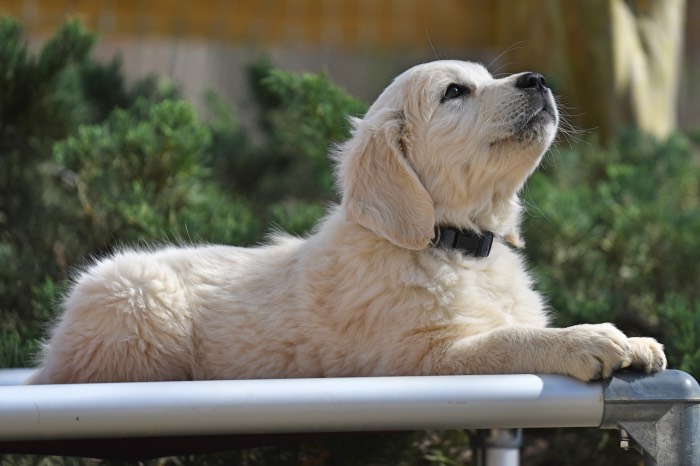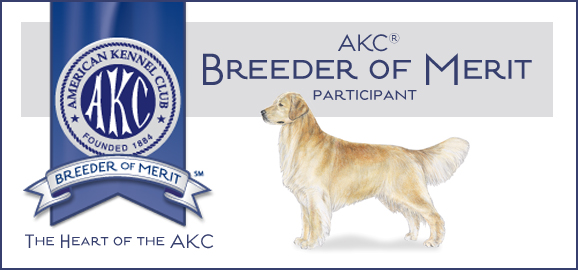The best possible time for puppies to change homes and leave the breeder is between 10 and 12 weeks of age if a breeder has the time and the talent to start them in training and to give each and every puppy ample individual attention. If a breeder does not have time to train their puppies, puppies should be placed with new families between 7 weeks 2 days and 8 weeks. We think that 7 1/2 weeks is best if over 10 weeks is not an option. Puppies do best if they change homes either before or after the 8-10 week fear period. No puppy should ever leave his litter prior to 7 weeks of age for any reason.
First we will discuss why later than 10 weeks is best. Then, we’ll go over why puppies do best when they change homes before 12 weeks.

Additional Time With Litter Mates
One very important reason for keeping our puppies until they are 10 to 12 weeks of age is to give puppies additional time with litter-mates. This extra time with litter-mates gives puppies a better foundation for relating to other dogs. And more importantly litter-mates teach each other bite-inhibition. Bite inhibition is the ability of a dog to regulate how strong his bite is.
Having good bite inhibition creates a gentler mouth and more importantly, it teaches a puppy to control the intensity of his bite in case he should have a knee jerk reaction and bite someone. For example, if you should slam a dog’s tail in a car door, he might react and bite out of fear and pain. If he has not practiced good bit inhibition as a puppy, his bite could do major harm. However, if he has good bite inhibition, his bite will instinctively be softer.
In addition, our 10 to 12 week old English Golden Retriever puppies are less mouthy than puppies leaving litter-mates sooner.
Later First Vaccine
Another advantage for later pick up is that it gives us an opportunity to give a first vaccine at the optimum vaccine time. Puppies vaccinated at older ages have fewer vaccine side effects. They also have a greater chance of having an immune response to the vaccine than puppies vaccinated sooner. We feel that 9 weeks is the optimum time for a puppy to have his first vaccine.
In fact, waiting for later vaccines is so important that before we started training all our puppies, we sent our puppies home without any vaccine at all. Early vaccines can set a puppy up for a wide variety of health problems.
Not Changing Homes During Puppy’s First Fear Period
Puppies go through a fear stage that peaks at 8 weeks and goes through about 10-11 weeks. By 10 weeks, most puppies are completely out of it. By 11 weeks, virtually all of them are out of it.
More Mature Digestive Systems
Another advantage that we’ve found in sending puppies home later revolves around the immaturity of young puppies’ digestive systems. Many 8-week old puppies experience digestive upsets when changing homes. Far fewer experience the upset at 10 1/2 to 12 1/2 weeks.
Easier Transition for the Family
Finally, we’ve found that many people are inexperienced with puppies. Many more have experience that is so far in the past that they don’t remember much of it. Training an 8-week old puppy is time consuming, sleep depriving, and sometimes exhausting.
Very few 8-week old puppies are able to sleep all night in a crate without needing to go outside. More than half of our 10-week old puppies are able to hold it for 6 hours. By 11 weeks, about 90% of our puppies can hold it for a 6 hour night or longer. Our 11 week old puppies are not fully house-trained by any means. However, by 11-weeks of age, our puppies are accustomed to peeing and pooping almost exclusively outside. Their bladders are a little more mature than at 8 weeks enabling them to hold it longer.
If you will take our 11 to 12 week old puppies out often enough, the number of accidents will be minimal.
Why Not Have Puppies Change Homes Even Later?
As we already discussed, there are many reasons to leave a puppy until he is 12] weeks of age. There are also several good reasons to not wait too long. We think that all puppies (unless there are extenuating circumstances) need to be in permanent homes by three months of age. Here is why.
The Benefit of Staying With Littermates Ends
First of all, puppies no longer benefit from staying with littermates at older ages. The benefits of leaving puppies with littermates grows tremendously until puppies are 10 weeks of age. The reason for this is bite inhibition development and learning good dog-to-dog behavior. However, after 10 weeks, these benefits level off. Then after 3 months of age, puppies need to learn to live independently from the litter.
Acclimation to Puppy’s Long Term Environment
Secondly, and most importantly, puppies need to be acclimated to the environment that they will ultimately be living in. If they will be living in a city, you should acclimate them to heavy traffic, loud noises, and big crowds early. Puppies that will be living on a farm need to be getting used to the sights, sounds, and smells of farm animals. Those puppies that are destined to be therapy dogs or service dogs need to be riding elevators as well as experiencing hospitals and doctor’s offices.
A Short Window of Opportunity
There is a window of opportunity for heavy socialization that ends when puppies are about 4 months of age. The period of time between a puppy turning three and four months needs to be packed full of as many different experiences in the type environment a puppy will be spending his life in as possible.
Breeders Are Limited
Breeders are not in a position to take puppies to many places. Public places and stores where other dogs frequent risk disease. Breeders need to be especially careful because certain diseases (like Parvo and Distemper) can kill an entire litter of young puppies. However, the risk of serious disease in a puppy who has had a 9-week vaccine is minimal. In fact, the risk of disease pales in comparison to the risks of not properly socializing a 12-16 week old puppy.
Starting the Socialization Process to Make It Easier For You to Finish It
We feel that we have found a “sweet spot” with regard to puppy socialization by starting the process of introducing our puppies to scary things that can be found in our home and on our property. In addition, we take our older puppies to other potentially scary locations where puppies can experience such things as fast moving and loud traffic and possibly construction equipment.
We know how to properly introduce puppies to something that is scary. Socialization is not simply a matter of throwing a puppy in every possible environment. You must do it with care. If you introduce a puppy too quickly to a new and scary environment, a socialization experience done wrong can do more harm than good. A puppy’s threshold of fear must be ascertained and this threshold cannot be crossed.
Us starting the socialization process for families gives puppies the self-confidence needed to face more and more new situations. The more situations you can properly introduce your puppy to, the easier it will become for the puppy to acclimate to even more situations that could possibly be scary. We start the process with what we have available on our property and what is accessible by mule thereby making it easier for families to pick up the socialization where we leave off. See our page on Puppy Socialization for more information on how to socialize a puppy.
Then by getting puppies by the time they are 3 months old, families have a full month to fine tune the socialization and environmental desensitization that we’ve started.
Travel Issues With Older Puppies
Three month old Golden Retrievers are pushing the limit on being able to travel in the cabin of an airplane. Because we keep our puppies growing slowly, our puppies can still fly at 12 weeks with most airlines.
If you were getting a puppy from most breeders, your 12 week old Golden would already be too large to fly in the cabin. Even our puppies are too large once they get over 3 months.
We keep our puppies growing slowly because there are tremendous health benefits that carry into later life. Studies have shown that it is important to keep puppies growing slowly until they are over 4 months of age. Slow growing puppies have lower chances of hip dysplasia and even lower cancer rates. (Unlike people, puppies that are overfed will grow too fast before they become fat.) An added bonus is that they can fly in the cabin of an airplane for longer!
In addition to the size issues, there can also be vaccine issues when traveling with puppies over 3 months of age. Most airlines require a rabies vaccine for puppies over 3 months. We feel strongly that 3 months is far too young to give a rabies vaccine.
More Information
See our page on Trained English Golden Retriever Puppies. This page will give you more information on what we do with our puppies before they leave us.

